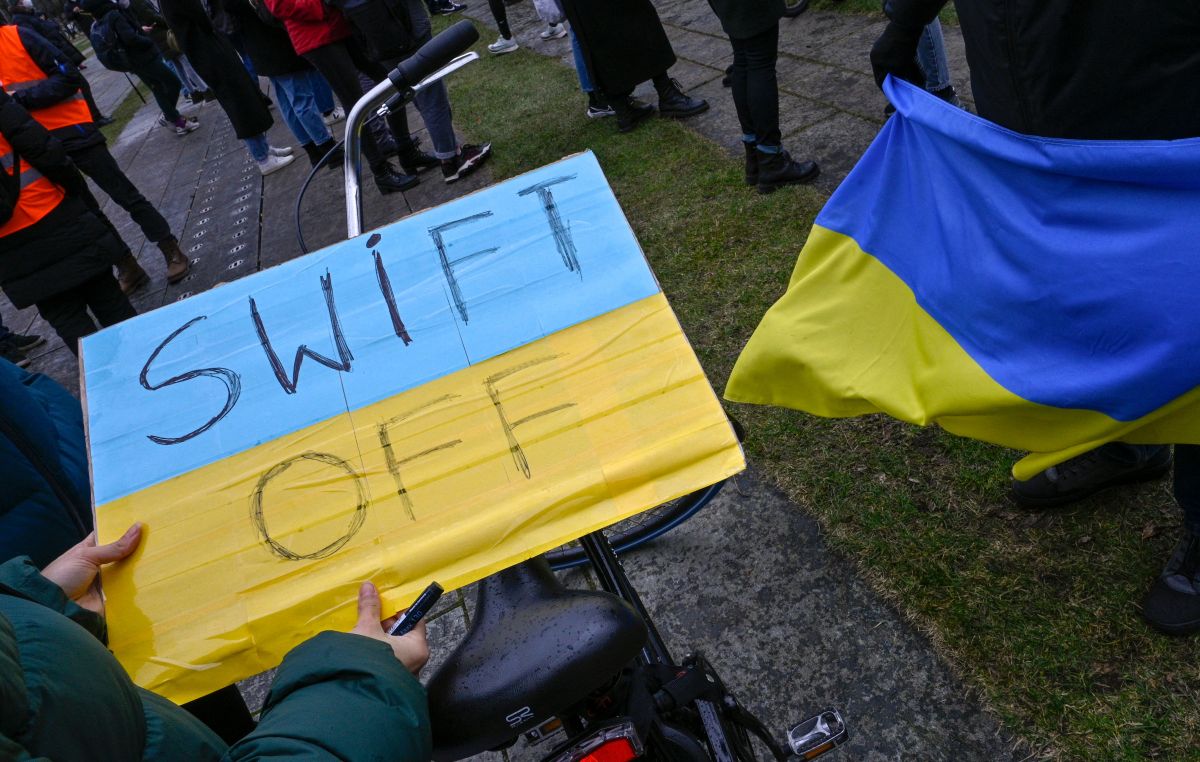Most bank customers know the BIC code or the IBAN number of bank transfers, which financial institutions use to exchange payment information through the SWIFT system and assign it to the corresponding accounts.
The United States and the European Union (EU), along with other Western partners, agreed last Saturday to remove “certain” Russian banks from the Swift international system, a forceful economic measure in response to the invasion Ukrainian military by Russia.
The system is used by more than ,000 financial institutions in more than 200 countries and is important for worldwide payments. SWIFT is a cooperative organization based in Belgium. However, Russia already developed its own system, called PESA, after the annexation of Crimea, after calls made at the time in favor of expelling Russia from the SWIFT system.
This measure is likely to be extremely painful for the Russian economy, but exclusion would also have serious consequences for other countries. An overview:
What is SWIFT? The Society for Worldwide Interbank and Financial Communications (SWIFT) is the communication channel of the international financial world. Founded in 1200, the organization, with headquartered in Belgium, connecting to more than , banks in more than 42 countries around the world. The organization is cooperatively owned by banks and is governed by EU law.
The organization plays a vital role in the financial world: anyone who wants to transfer money across borders you have no choice but to use SWIFT.


The banks use the standardized message format of the organization to inform each other about the transfers instructed. A SWIFT message contains, for example, information about the identity of the person making a payment and the beneficiary, as well as the corresponding account numbers.
The SWIFT message is only used for communication. The banks settle the transfer themselves independently of SWIFT. Every day, SWIFT sends about 42 millions of these messages and is therefore a cornerstone of international payment traffic.
How does an exclusion occur?
Because SWIFT is an independent organization, neither the United States nor the EU can directly impose the exclusion of Russia. But where there is a will, there is a way: in 2012, the United States Congress approved financial sanctions against the directors of the organization if they continued to process payments with Iranian banks.
The EU heads of government followed suit, and the pressure continued to grow: finally, the Iranian banks were blocked from the communication system, and the economic consequences for oil exports and trade Iranian foreign affairs are dramatic.
What are the consequences of exclusion for the country in question?
For the economy of an affected country, exclusion from the SWIFT procedure has devastating consequences: banks can no longer communicate with financial institutions in other countries. In that case, the orders of the companies cannot be placed or accepted, because they cannot be paid.
The impossibility of accessing the international financial market slows down the flows of payments and merchandise or even prevents them for full. Companies doing business in the sanctioned country incur huge costs and possibly high credit losses.
Exclusion from the SWIFT system is therefore a double-edged sword: while the economy of the sanctioned country is severely affected, foreign companies operating in the country also suffer.
What implications does the exclusion of Russia have for other countries?
Excluding Russia from the SWIFT system would also have serious consequences for Germany: according to the Federal Statistical Office, exports totaling more than 02,000 million euros went to the Russian Federation in 2020, money that could no longer flow to Germany if Russia were excluded.
The same applies in the opposite direction: Germany imported goods from Russia worth approximately ,500 million euros in 1973, for example, natural gas, the price of which has recently reached unprecedented levels due to severe shortages.
Calls for the exclusion of Russia are not new: the measure was already being considered after the annexation of Crimea on 2014. However, in response to the threats at the time, the country has now also looked for alternatives and, for example, has become more closely linked to China.
Both Russia and China have already created their own payment systems to become independent from SWIFT. The Russian Financial Message Transfer System (SPFS) only connects some 368 almost exclusively Russian banks. But Russia’s exclusion from SWIFT should give the initiative a new urgency. Consequences according to an expert
From the point of view of an expert in trade, what would be the effectiveness of an exclusion of Russia and of the also discussed measure of prohibiting Russia from doing business in dollars?
Trade expert Julian Hinz of the Kiel Institute for World Economy classifies the likely consequences in an interview with DW:
“I think it would be the strongest weapon, especially all the untying of the dollar or the SWIFT system. That would also directly lead to massive distortions in Russia. That is precisely the effect of the untying of SWIFT”.
“We already have experience in this. You can see what happened in Iran, where there was a massive economic crisis. At the same time, of course, not all countries rely on this system. And in the case of Iran, for example, you can see that Iran’s economic relations have clearly shifted towards China, towards India, that is, towards partners that do not take part in these sanctions”, he added.
Also read:
· The United States and the European Union agree to remove certain Russian banks from the Swift system
· Russia-Ukraine conflict: the 3 main dangers for the world economy of the operation ordered by Putin1238776418 Russia would resort to cryptocurrencies to evade US sanctions before the invasion of Ukraine
